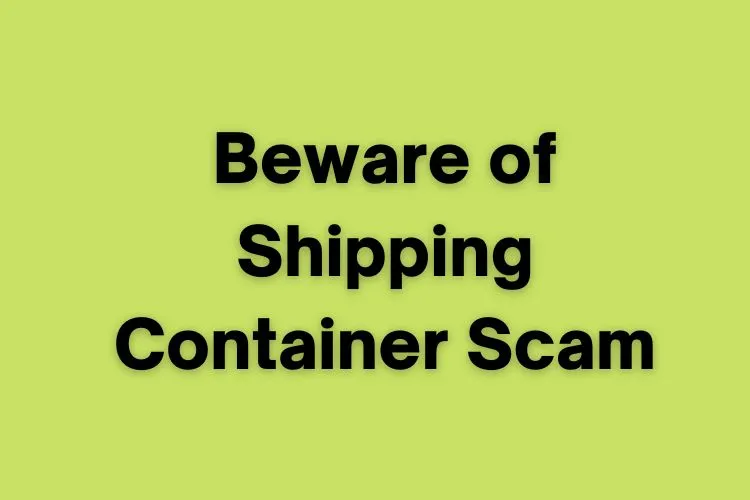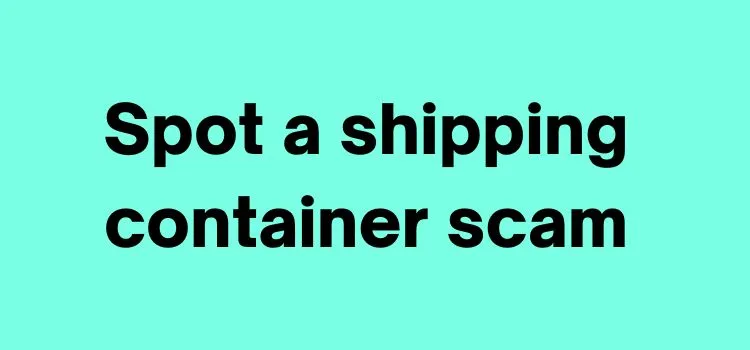Beware of Shipping Container Scam in 2023

There are all sorts of scams around us. Shipping container scam is one of them. Although such scams already existed in the past, scammers have been making most of the social media platforms.
Scams are everywhere, and in the past, it wasn’t easy to gauge which ones were genuine deals and which were not. The digital era we live in too is a bane and a boon at the same time.
Bane, as we have scams everywhere, it is challenging to spot a scam as they are well fabricated. Scammers take every effort possible to pose as the real deal. Additionally, they advertise throughout the social media platform, making it challenging even for a keen-eyed person to spot any flaws.
The boon of the digital era is that it makes it possible for us to spread the word about a scam and make people aware. Thus there is a constant tussle between the fake adverts and the spread of awareness about the scams.
So how did it all start?
Since we live in the digital era, the entire logistical environment has changed for good. As a result, logistical companies are forever competing to provide fast and easy service to their clients.
It is challenging and requires more money and time to deliver goods from point A (the origin of the shipment) to point B (the clients’ delivery address). Therefore, companies have satellite points from where they drop their shipments at a pre-designated area, and from these pre-designated places, goods are finally distributed to their respective destinations.
Frequent online purchases and the pressure to deliver them at the quickest possible time at a premium is almost a nightmare for these companies. Moreover, buying additional space for the satellite points costs money to maintain and keep stored up. At times, these satellites might even be used for certain seasons.
And this is where shipping containers come into place. The owners of the shipping containers sell their containers on a lease to buyers at a reasonable rate. These containers are further sold to logistical companies by buyers for a profit.
Since storing goods in these containers for a specific period is cheap, logistical companies do not need to spend more than they would have if they had to build a storage facility alone. However, security for such storage facilities adds up to the cost.
Thus storing their goods at a reasonable rate, is a win-win situation for both the logistical companies and the buyer who has the container leased from the shipping container seller. These shipping container sellers are spread out throughout the country. Thus, it is quite advantageous for logistical companies. Define Trade in Business helps for better understanding.
So, what is the risk if such shipping container sellers are spread throughout the country?
The risk lies in the fact that these shipping container sellers are spread throughout the country. People know about this fact and get ripped off for the same reason.
So how does a potential investor or buyer know if the seller is not indulging in a shipping container scam?
Most of the adverts are spread like wildfire on the internet. Scammers, after ripping off, usually delete their web presence. And after some time, they will create a new web page or online presence with new adverts to lure people with easy money.

There are tell-tale signs to spot a shipping container scam.
- Scammers will delete their profile and web presence on the social media platform once they have conned sufficient victims. Then they will create a new profile, and the cycle continues. However, when they create a profile, it will usually be a recent one.
- Read the testimonies. No person in this world is ever happy with the kind of service they get. They will always find some faults with the service provider. If the seller is genuine, they are bound to be subjected to complaints by the customers. Go through the entire review page and try to gauge the customers’ overall experience.
- Check the domain name. An old and genuine seller will usually have an old domain name.
- Always check for the seller’s reputation before even considering entering a deal.
- Confirm the contact number provided on the advert. Cross-check with google maps to verify the authenticity of the place. Once satisfied, call the number to authenticate the seller again.
- Scammers usually offer containers at a “too good to be true” price. Cross-verify the price of the competitors in the area.
- It would be in your best interest if you were to physically go to the place to verify the seller’s authenticity. It is always a good idea to examine the containers on the site.
- Avoid finalizing the deal on the phone and avoid opening up your wallet very quickly. Scammers will usually rush you into concluding the contract so that they can empty your pockets.
Conclusion:
Although it is good to search for an alternative source of income in this current economic crisis, it would be wise on your part to check the authenticity of the deal you are getting into. Investing in shipping containers is an excellent way to raise your income as the logistical companies have started their operations again. It would be advisable to check and double-check the deal before finalizing it as it would ensure that you avoid later financial burns.
